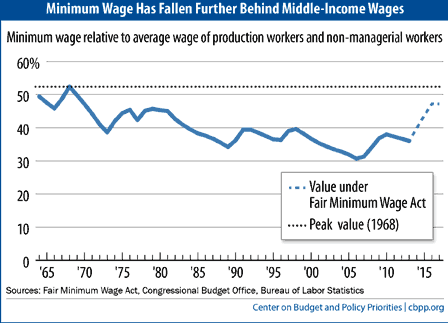INSTITUTE INDEX: Does raising the minimum wage really kill jobs?

Level to which the Fair Minimum Wage Act that's been proposed in Congress would raise the hourly minimum wage: $10.10
Percent by which the current minimum wage of $7.25 an hour is below its late 1960s purchasing-power peak, after adjusting for inflation: 22
Number of low-wage workers who would get a raise if the proposal became law, according to an analysis released this week by the nonpartisan Congressional Budget Office (CBO): 16.5 million
Percent of workers who would benefit from the raise who are not teenagers: 88
Number of families the wage hike would lift out of poverty: 900,000
Additional money the wage hike would provide to impoverished families: $5 billion
Number of other workers who currently earn just above $10.10 an hour and could see a raise due to the "ripple effect" of the new wage structure: as many as 8 million
Percent by which the minimum-wage hike proposal could reduce total employment, according to the CBO: 0.3
Number of workers that represents: 500,000
Number of days after the CBO released its analysis that the White House, which has been promoting the minimum wage hike, held a press call to dispute the job-loss estimate: 1
Number of Nobel Prize winners who disagree with the CBO and say the weight of evidence is that minimum-wage hikes have little or no negative effect on employment: 7
Number of former presidents of the American Economic Association who say likewise: 8
Number of other economists who agree with them: more than 600
Percent of economic experts polled by the University of Chicago Booth School of Business who agreed that the benefits of raising the minimum wage outweigh any potential costs: 62
Percent who disagreed: 16
(Click on figure to go to source.)
Tags
Sue Sturgis
Sue is the former editorial director of Facing South and the Institute for Southern Studies.
